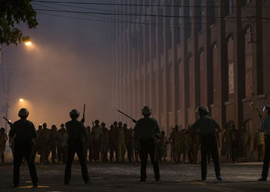
August 02, 2017

Watching Detroit, it’s hard not to sympathize with the much-derided jurors because the sequence of events shown by the movie doesn’t make much sense.
In the film, a number of black men and two white prostitutes are partying during the riot at the quasi-bordello when a particularly stupid one, Carl, pulls out a gun and starts banging away at the Army unit outside. (But, it’s explained, it wasn’t a real gun; it was merely a track-meet starter pistol loaded with blanks. No gun, actual or quasi-actual, was ever found.)
The military call the cops, who frantically storm the bordello looking for snipers. They gun down the shooter almost instantly.
The Detroit police, led by a trigger-happy maniac played by Will Poulter, whose bizarre eyebrows make him look just like Sid, the weird bad kid in Toy Story, then line up the surviving black men and white hookers and start physically and psychologically torturing them to confess to who did the sniping. (The obvious references are to Bigelow and Boal’s invade-the-world movies about Iraq and Afghanistan, where Americans have had to deal with interrogating possible terrorists from a radically different culture.) Eventually, two more blacks wind up shot, including a member of the entourage of a minor Motown singing group
For reasons that have never been explained, the suspects refused, even under extreme duress, to incriminate Carl, the dead guy whom the cops had already shot, as the sniper. Perhaps the real gunman was one of the suspects, who managed to intimidate the other suspects into not revealing his identity? But the movie shows the dead man shooting his tiny gun at the Army, which makes it irritating that we have to then sit through 90 minutes of enhanced interrogation, during which any of the survivors could have simply said, “You shot the right guy, we’ll testify to that in court, we’re going home now?” It’s almost as if Bigelow and Boal don’t really believe the politically correct story they are telling.
The more I look into the history, the more mobbed-up the black victims at the quasi-whorehouse appear to be. Being a good singer doesn’t mean you aren’t friends with gangsters, as the life of Frank Sinatra would demonstrate. It goes unmentioned in the movie that the musicians, who are portrayed as being as innocent as Trayvon Martin and Michael Brown combined, are said to have been signed by Detroit’s top numbers racketeer, Fast Eddie Wingate.
This hardly means that the killer cops were justified in whatever it was they did, but suspicions like this might help explain why the witnesses could never get their stories straight. Ironically, the cops were saved by the liberal Warren Court’s innovation of Miranda rights: Their confessions were ruled inadmissible.
What makes Detroit a better movie than it sounds is that Bigelow and Boal, in their uneasy awareness that their reconstruction of events isn’t all that plausible, can’t seem to help subverting the simple hate-whitey propaganda melodrama that the critics wanted from them.